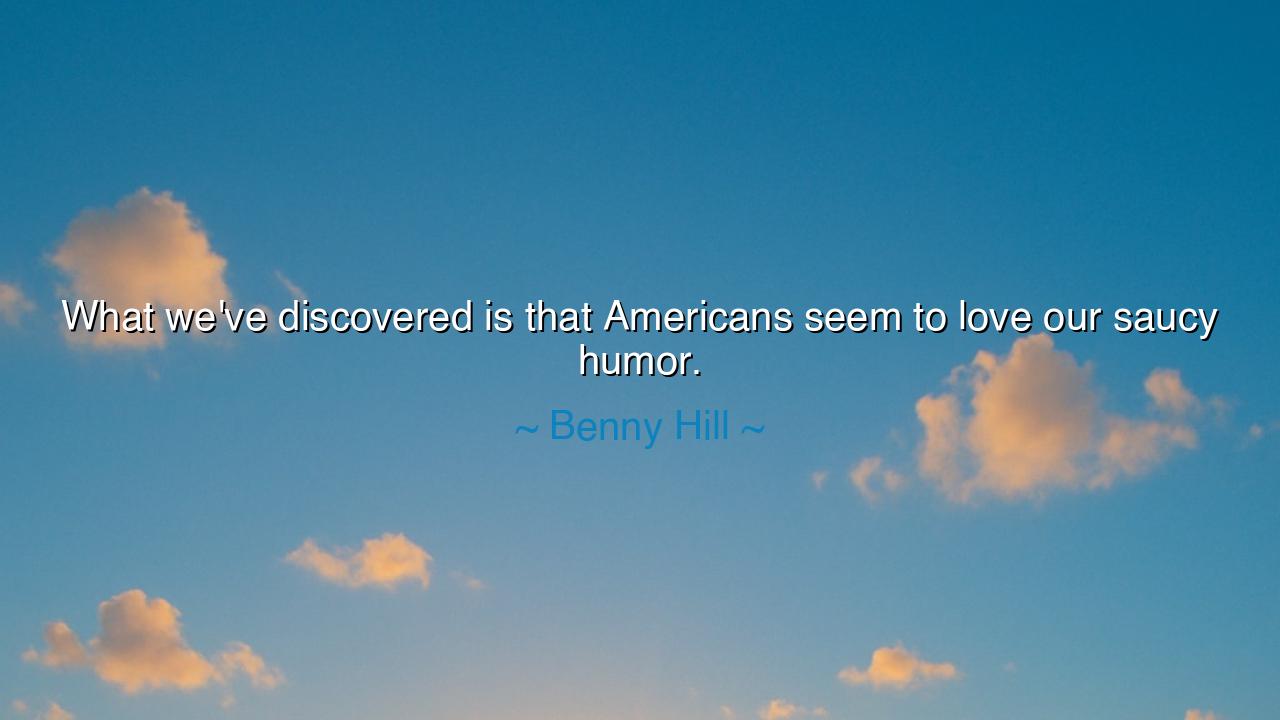
What we've discovered is that Americans seem to love our saucy






The words “What we’ve discovered is that Americans seem to love our saucy humor” by Benny Hill sparkle with the mischief of a jester who understood the power of laughter to bridge worlds. Beneath the playfulness lies a deeper revelation about the human condition — that joy, even when wrapped in boldness and innuendo, transcends culture, class, and continent. Hill’s statement is not merely about comedy; it is about connection. It speaks to that shared spark within all people — the need to laugh at life’s absurdities, to lighten the burdens of existence through humor that is unashamed, unfiltered, and alive.
To understand this truth, we must look to the world Benny Hill came from. Postwar Britain was a land gray with ration books and quiet sorrow. The people longed for color, for laughter, for something that reminded them they were still human. Hill brought them that — a humor that was saucy, filled with double meanings, physical comedy, and a childlike delight in mischief. It was a laughter that freed people from pretense. When his work crossed the ocean and Americans embraced it, it was a sign that humor knows no borders — that the heart’s need for levity is older and more universal than any flag or accent.
His phrase “saucy humor” captures more than cheekiness; it is the laughter that dares to be irreverent, that mocks prudery, that refuses to bow before the dull weight of propriety. The ancients, too, knew such laughter. In the festivals of Dionysus, the Greeks celebrated through ribald songs and bold plays that mocked kings and gods alike. They knew, as Hill knew, that laughter has sacred power. It releases the tension of repression; it reminds mortals that even the mighty stumble, that life is both sacred and silly. In every era, the saucy comedian is a kind of philosopher — one who teaches not through sermons, but through giggles and blushes.
There is, too, a hidden wisdom in what Hill discovered — that Americans loved his humor because it reflected their own contradictions. America is a nation of pioneers and dreamers, but also of restraint and rules. Hill’s playful boldness struck a chord: it allowed people to laugh at their own taboos, to see that the things they were taught to hush might be better met with mirth. Saucy humor, at its heart, is not vulgarity — it is liberation. It says, “We are all flawed, all foolish, all wonderfully human.” To laugh at that is not to degrade ourselves, but to embrace our shared imperfection.
History offers countless examples of humor healing division. Consider Charlie Chaplin, who, without a single word, made both rich and poor laugh during the Great Depression. His humor — innocent yet biting — united nations in silent understanding. Or consider Mark Twain, whose wit exposed the hypocrisies of his age even as it made his readers howl with laughter. Like Hill, they wielded humor as a bridge between truth and comfort, between exposure and empathy. Through laughter, they taught that the soul survives not by solemnity, but by the ability to smile amid struggle.
In the end, Benny Hill’s discovery is a mirror for all ages: laughter is a universal language, and humor is humanity’s rebellion against despair. Whether it is “saucy” or subtle, it springs from the same sacred source — the refusal to let life’s hardships define us. The one who can laugh at themselves has already mastered the art of survival. The one who can make others laugh has learned how to heal them without medicine, how to unite them without speeches.
And so, children of the modern world, let this teaching guide you: never lose your laughter. Let it be daring, honest, and kind. Laugh at absurdity, at pride, at fear — even at yourself. Do not confuse dignity with dullness, nor reverence with repression. As Benny Hill’s spirit whispers through time, to laugh freely is to live freely. For when humor flows like a river between hearts, there is no “British” or “American,” no wall between man and man — only the sound of joy, echoing across the world like a shared heartbeat.






AAdministratorAdministrator
Welcome, honored guests. Please leave a comment, we will respond soon